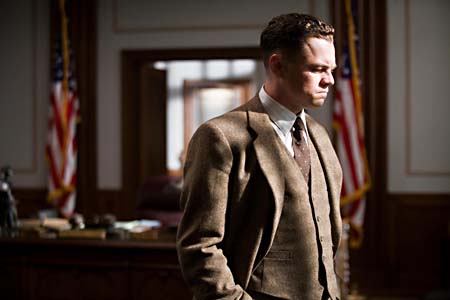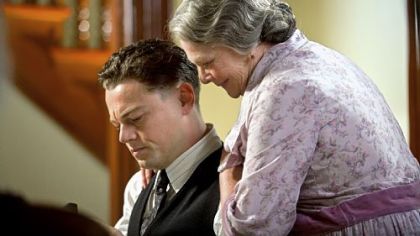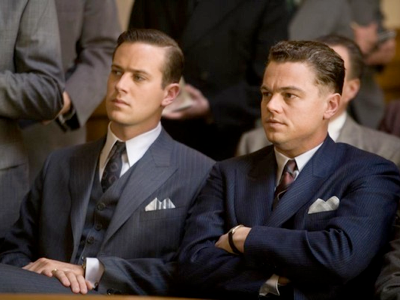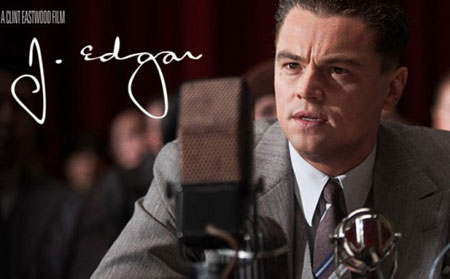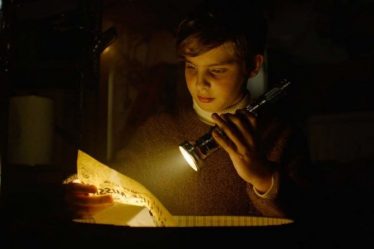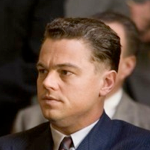
Friday, November 11, 2011
Cinema Siren spent a delightful afternoon some months ago watching the filming of “J. Edgar” from the window of Iron Bridge Wine Company in Warrenton. They were filming the scene of the Lindbergh kidnapping trial in Old Town, and while a crowd of curious onlookers stood in the cold, Siren and sister drank wine and watched the cameras and action. Not enough gets filmed in Virginia for it to get old (yeah, LA, it’s still novel to us); we were excited for the film to come out so we could cheer Warrenton’s brief stardom onscreen.
This makes the disappointing unevenness of Eastwood’s latest offering even less fun to report than the usual negative review. Siren knows every movie starts out with great expectations and hopes, so it’s never fun to find a movie wanting… Now, with “Hereafter,” this director has had two less-than-stellar releases in a row. Both movies lack a strong story arc, leading them both to fall on their own weighted narrative swords.
The self-narration by the title character which assumes a skewing of facts and history about himself suggests Clint Eastwood’s agenda is to show the tenacious lifelong hold one man with great power has on his self perception.
Fact or fiction, accurate or self-manipulated, Eastwood’s Hoover stays the same hard-bullying, egocentric, bigoted homophobe while seeing himself as a patriot keeping America safe and building a better world. As a viewer, though, with Hoover’s narration, one never knows what is historic or uniquely viewed through his eyes.
Ultimately it seems a cheap trick that releases Eastwood from committing to any strong points of view as director. In his desire to stay objective and balanced he undoes himself and dulls potential intensity that a clear directorial perspective offers. We are left wondering: “Is Hoover suffering as a lover closeted by constraints he feels from society, or is he an unfeeling bullish megalomaniac?” If he is both, show us a strong story that commits to both. Objectivity is for documentaries, my friend. Choose a side.
And if the device of Hoover’s voiceover narration was his idea, he should know the meanderings of his voice mixed with where they take us in history come off as the ramblings of Hoover as a senile old man. Is everything inside his mind, or is it part history, part memory? It begins to feel like this story and “Abraham Lincoln: Vampire Hunter” can be equally depended upon for historical accuracy…
Thanks to Leonardo DiCaprio’s impressive portrayal we do at least get some sense of Hoover’s inner demons and emotional struggle. He saves these ramblings, and what the script and direction might have molded into melodramatic caricature, and gives us some visceral intensity onscreen. He is a tightly bundled and controlled ball of nerves, and plays Hoover like he is forever just trying to stay up to the task of being himself. If film fans need a reason to venture to this unequal film, he is it.
Unfortunately, much of the emotional tension DiCaprio builds is squelched by the constant switching back and forth in time and Eastwood’s need for Hoover’s placement in so many historic contexts. It devolves into “Life of Hoover: The Greatest Hits.”
We get most understanding of him from his suffocating relationship with his mother (played to creepy and dour perfection by Judi Dench), his supposed inspiration to become, in his mother’s words, “the most important man in the United States.” A complicated relationship (they always are), she never lets up, and never once compliments him at his work, but at her death he puts her pearls and her dress on and weeps fetal-style in a corner. That is the one cinematic reference to the persistent rumor he dressed in women’s clothes. For those of you curious, most believe the stories of Hoover’s cross-dressing is urban legend, built by gay bashers. For a man who controlled Washington with private files filled with rumors and damaging evidence, it’s ironic this rumor about him persists after so many years.
His lifelong relationship with Clyde Tolson, his constant business companion, with whom he shared lunch and dinner almost every night of his adult life, and with whom he vacationed and frequented night clubs, is portrayed as an unconsummated partnership more clearly difficult to endure by Tolson. A few scenes delve into slightly more controversial territory, but the film makers seem to infer that, whatever their partnership was, Hoover chose to maintain an outward appearance of hate for all things gay, expressing a universal and vitriolic homophobia. Whether the ambiguity is intentional or not, their interactions leave us wanting more, and make the film feel like a cop out. Odd, since writer Dustin Lance Black, Oscar winner for the original screenplay for Milk, is not one to shy from topics representing gay issues and subjects.
As Tolson, Armie Hammer is a genuine surprise. He finds ways to let us see Tolson’s inner struggle, and how his steadfast adoration and commitment to a frequently demeaning or dismissive Hoover effects him, and without much dialogue. Cinema Siren sees he is an actor to watch… He’ll soon be cracking the “A” list with Gore Verbinski’s “The Lone Ranger.”
The less said about Clint Eastwood’s soundtrack, which nearly singlehandedly destroys the movie, the better. He’s never met the top end of a piano he couldn’t wedge into the proceedings. That might work for some genres, but it’s woefully inappropriate for this film. Doesn’t anyone in his production posse have Thomas Newman or Hans Zimmer on speed dial?
There are only two reasons to see this movie. The first is for Leo and Armie’s acting. Worthy enough, even with the uneven script and meanderings through history, to get you to sit and watch over two hours of grumpy men alternately in gorgeous suits and age make-up. The second is if you live in and around Warrenton, or know it. You’ll see the town featured for a red-hot second during the Lindbergh trial.
There might be better things to do with your two hours and 17 minutes. You could start private files on all your enemies. Fingerprint yourself. File your books in Hoover’s beloved Dewey Decimal System. Or unlike Hoover, you could practice your smile. Or go have some fun. Siren’s just making suggestions…It’s your call.


